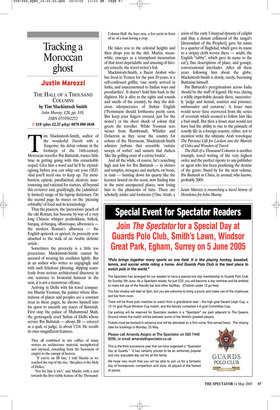Tracking a Moroccan ghost
Justin Marozzi
THE HALL OF A THOUSAND COLUMNS by Tim Mackintosh Smith John Murray, £20, pp. 318, ISBN 0719562252 ✆ £18 (plus £2.25 p&p) 0870 800 4848 Tim Mackintosh-Smith, author of the wonderful Travels with a Tangerine, his debut volume in the footsteps of the 14th-century Moroccan traveller Ibn Battutah, wastes little time in getting going with this remarkable sequel. Give him a word and he’ll be etymologising before you can whip out your OED. And you’ll need one to keep up. Try moxibustion, epizoic, parallactical, aleatory, anastomosing and vaticinal for starters, all beyond this reviewer and, gratifyingly, the (admittedly limited) range of his laptop dictionary. On the second page he muses on the ‘pleasing orbitality’ of food and its terminology.
Thus the praecox, the ‘precocious’ peach of the old Roman, has become by way of a very long Chinese whisper praikokkion, birkok, barquq, al-barquq, albarcoque, albercocca the modern Roman’s albicocca — the English apricock or apricot, its precocity now attached to the stalk of an Arabic definite article.
Sometimes the precocity is a little too precocious; Mackintosh-Smith cannot be accused of wearing his erudition lightly. But in an author who writes so engagingly and with such felicitous phrasing, slipping seamlessly from serious architectural discourse in one sentence to lavatorial humour in the next, it is not a monstrous offence.
Arriving in Delhi with his travel companion Martin Yeoman, the painter whose illustrations of places and peoples are a constant treat in these pages, he throws himself into his quest to unearth any traces of Battutah. First stop the palace of Muhammad Shah, the grotesquely cruel Sultan of Delhi whose service Ibn Battutah — always IB — entered as a qadi, or judge, in about 1334. He recalls its once magnificent features.
They all combined in one edifice of many storeys an architecture material, metaphorical and mystical, extending from the basement of empire to the canopy of heaven.
‘If you’re an IB fan,’ I told Martin as we reached the top of the rise, ‘this place is the Holy of Holies.’ ‘Not for him it isn’t,’ said Martin, with a nod towards the first visible feature of the Thousand Column Hall: the bare arse, a few yards in front of us, of a man having a crap.
He takes you to the celestial heights and then drops you in the shit. Martin, meanwhile, emerges as a triumphant incarnation of that most dependable and amusing of literary conceits, the travel writer’s foil.
Mackintosh-Smith, a fluent Arabist who has lived in Yemen for the past 20 years, is a self-confessed griffin, ‘one newly arrived in India, and unaccustomed to Indian ways and peculiarities’. It doesn’t hold him back in the slightest. He is alive to the sights and sounds and smells of the country, be they the delicious idiosyncrasies of Indian English (‘Permission should forthcome pretty soon. But keep your fingers crossed, just for the nonce’) or the sheer shock of colour that greets the traveller. While Yeoman sees scenes from Rembrandt, Whistler and Delacroix as they scour the country for echoes of the Moroccan, Mackintosh-Smith admires turbans that resemble ‘outsize scoops of sorbet’ and sunsets that darken ‘like the grilling crust of a crème brulée’ .
And all the while, of course, he’s searching high and low for Ibn Battutah — in shrines and temples, mosques and markets, on boats, in taxis — hunting down his quarry like the keenest hound on the scent, now finding him in the most unexpected places, now losing him to the phantoms of time. There are scholarly asides and footnotes (‘One Attab, a scion of the early Umayyad dynasty of caliphs and thus a distant collateral of the tangal’s [descendant of the Prophet], gave his name to a quarter of Baghdad, which gave its name to a stripey cloth woven there — attabi, the English “tabby”, which gave its name to the cat’), fine descriptions of place, and gossipy, conversational interludes. After all these years following him about the globe, Mackintosh-Smith is slowly, surely, becoming Battutian himself.
Ibn Battutah’s peregrinations across India should be the stuff of legend. He was, during a wildly improbable decade there, successively ‘judge and hermit, courtier and prisoner, ambassador and castaway’. A lesser man would never have recovered from the series of reversals which seemed to follow him like a bad smell. But then a lesser man would not have had the ability to rise to the pinnacle of courtly life in a foreign country, either, not to mention write the ultimate Arab travelogue The Precious Gift for Lookers into the Marvels of Cities and Wonders of Travel.
The Hall of a Thousand Columns is another triumph, travel writing of the very highest order and the perfect riposte to any publisher or agent who has been predicting the demise of the genre. Stand by for the next volume, Ibn Battutah in China, in around, who knows, probably 2009.


































































 Previous page
Previous page